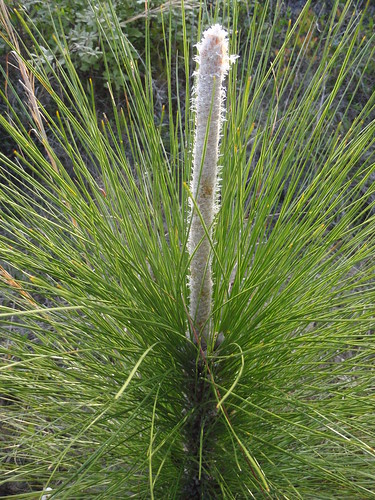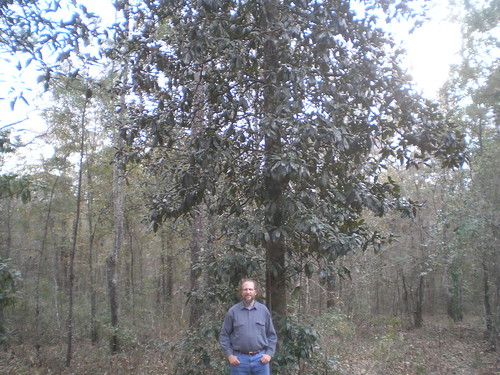This nine foot loblolly is about 3 years old, as you can see since John S. Quarterman can reach 8 feet high and it’s a foot higher than that: Continue reading
Yearly Archives: 2010
HFCS downfall?
 Let’s hope Melanie Warner, writing in bnet, is right about
The Death of High Fructose Corn Syrup:
Let’s hope Melanie Warner, writing in bnet, is right about
The Death of High Fructose Corn Syrup:
The back-to-back, double whammy announcements that PepsiCo (PEP) is ditching high fructose corn syrup in Gatorade along with the results of a scathing new study from researchers at Princeton make it official — allies of the controversial sweetener have lost the war.
What the Princeton researchers found was
A sweet problem: Princeton researchers find that high-fructose corn syrup prompts considerably more weight gain,
as we noted here a while back.
And, as we noted last year, there’s also
an eerie correlation of the spread of
HFCS into the food supply with the rise of obesity in the U.S.

Here’s Melanie Warner again, this time in the New York Times:
Hunt’s ketchup is among the latest in a string of major-brand products that have replaced the vilified sweetener. Gatorade, several Kraft salad dressings, Wheat Thins, Ocean Spray cranberry juice, Pepsi Throwback, Mountain Dew Throwback and the baked goods at Starbucks, to name a few, are all now made with regular sugar.
Why is Big Food buckling about bogus sugar?
What started as a narrow movement by proponents of natural and organic foods has morphed into a swell of mainstream opposition, thanks in large part to tools of modern activism like Facebook, YouTube and Twitter and movies like “Food, Inc.” and “King Corn.”Well, well. Voting at supermarket checkout seems to be working after all!
Windowfall
Rain pouring through window, Nashville, Tennessee, 2 May 2010.
Meanwhile, upmoat: Continue reading
Elsie Quarterman Glade Festival
 Some of you may remember my aunt, Elsie Quarterman, born in Valdosta,
played basketball for Hahira High School:
Some of you may remember my aunt, Elsie Quarterman, born in Valdosta,
played basketball for Hahira High School:
At 99 years old she won’t be outwalking everybody like she used to, but she will be there. Road trip to Lebanon, Tennessee? Y’all come!Cedars of Lebanon State Park will host its annual Elsie Quarterman Cedar Glade Wildflower Festival April 30 – May 1. Held in partnership with The Center for Cedar Glade Studies of Middle Tennessee State University, this event will offer visitors an opportunity to learn more about the area through seminars, guided nature walks, exhibits, guest speakers and naturalist displays. All events are free and open to the public.
“We are honored to be hosting this 33rd annual event and excited about the roster of experts on hand during this two-day festival,” said Park Ranger and Naturalist Wayne Ingram. “We have numerous activities and educational opportunities planned for all ages and encourage everyone to join us – rain or shine.”
Dr. Elsie Quarterman was professor Emeritus of Vanderbilt University and pioneered cedar glade research in the early 1950s. Coupled with her extensive research at this site, Dr. Quarterman has been an advocate for natural area protection throughout her distinguished career. Her efforts helped Tennessee in 1971 become one of the first states to pass legislation to protect natural areas in the U.S.
Echinacea tennesseensis, the Tennessee coneflower, thought to be extinct until Elsie rediscovered it: Continue reading
Hamster Roundup: sterility and infant mortality

|
“This study was just routine,” said Russian biologist Alexey V. Surov, in what could end up as the understatement of this century. Surov and his colleagues set out to discover if Monsanto’s genetically modified (GM) soy, grown on 91% of US soybean fields, leads to problems in growth or reproduction. What he discovered may uproot a multi-billion dollar industry.Not just a little higher: five times highher infant mortality.After feeding hamsters for two years over three generations, those on the GM diet, and especially the group on the maximum GM soy diet, showed devastating results. By the third generation, most GM soy-fed hamsters lost the ability to have babies. They also suffered slower growth, and a high mortality rate among the pups.
And it’s not necessarily the soybeans themselves: Continue reading
Ladybug: Natural pest control
Here’s a movie: Continue reading
The superb magnolia
“DURING a progress of near seventy miles, through this high forest, there constantly presented to view on one hand or the other, spacious groves of this fine flowering tree [the dogwood], which must, in the spring season, when covered with blosoms present a most pleasing scene; when at the same time a variety of other sweet shrubs display their beauty, adorned in their gay apparel, as the Halesia, Stewartia, Æsculus pavia, Æsc. alba, Æsc. Florid. ramis divaricatis, thyrsis grandis, flosculis expansis incarnatis, Azalea, &c. intangled with garlands of Bignonea crucigera, Big. radicans, Big. sempervirens, Glycine frutescens, Lonicera sempervirens, &c. and at the same time the superb Magnolia grandiflora, standing in front of the dark groves, towering far above the common level.”Picture of John S. Quarterman in front of a magnolia by Gretchen Quarterman, Lowndes County, Georgia, 19 Dec 2006.
—William Bartram, 1773
Dogwoods blooming
Like snow in the sky: Continue reading
Snow in Lowndes County
Enough to make snowballs: Continue reading
Beta Agonists and Bovine Growth Hormone
 Martha Rosenberg writes in CounterPunch,
If You Liked Bovine Growth Hormone, You’ll Love Beta Agonists:
Martha Rosenberg writes in CounterPunch,
If You Liked Bovine Growth Hormone, You’ll Love Beta Agonists:
As much as twenty percent of Paylean, given to pigs for their last 28 days, Optaflexx, given to cattle their last 28 to 42 days and Tomax, given to turkeys their last 7 to 14 days, remains in consumer meat says author and well known veterinarian Michael W. Fox.Though banned in Europe, Taiwan and China–more than 1,700 people were “poisoned” from eating Paylean-fed pigs since 1998 says the Sichuan Pork Trade Chamber of Commerce– ractopamine is used in 45 percent of US pigs and 30 percent of ration-fed cattle says Elanco Animal Health which manufactures all three products.
What effects could these drugs have?
According to Temple Grandin, Professor of Animal Science at Colorado State University, the “indiscriminant use of Paylean (ractopamine) has contributed to an increase in downer non-ambulatory pigs,” and pigs that “are extremely difficult to move and drive.” In Holsteins, ractopamine is known for causing hoof problems, says Grandin and feedlot managers report the “outer shell of the hoof fell off” on a related beta agonist drug, zilpateral.A article in the 2003 Journal of Animal Science confirms that “ractopamine does affect the behavior, heart rate and catecholamine profile of finishing pigs and making them more difficult to handle and potentially more susceptible to handling and transport stress.”
Surely such animal drugs would have no effects on human? Well, except they’re used to treat children for asthma. Not the sort of thing you really want in the food and water supply.
Rosenberg asks how did this happen, and points out the answer: massive lobbying by big agribusiness.
The FDA’s approval of a drug for food that requires impervious gloves and a mask just to handle is reminiscent of the bovine growth hormone debacle.
And in that debacle, Monsanto didn’t just lobby the FDA, it lobbied the press, including making Fox rewrite a story 80 times.




